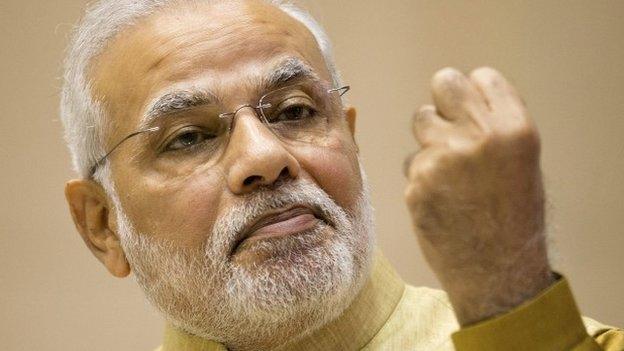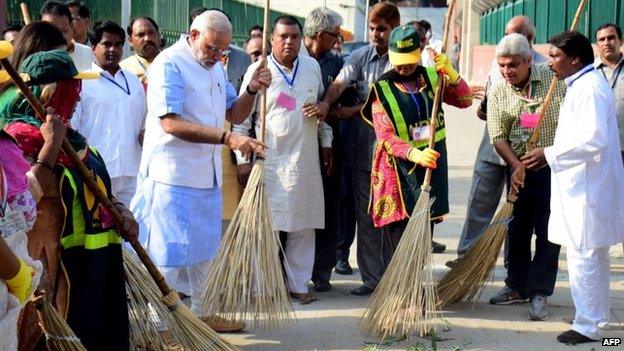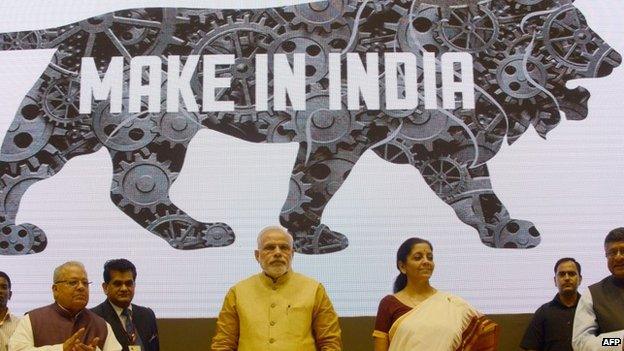Will Narendra Modi change India?
- Published

Narendra Modi led his BJP to a historic election win
He is a powerful speaker and draws huge crowds. He talks about himself in the third person. He's the most energetic leader India has had in years, burning the midnight oil and campaigning for his party with equal fervour.
He's also an astute performer: recently he dropped into a police station and picked up a broom to promote a campaign to clean up India. Behind the bluster and performance, he, according to insiders, is a loner who trusts his instincts but very few people.
Narendra Modi is also possibly India's most powerful leader after Indira Gandhi, external, the mercurial former prime minister.
Five months ago he led his Hindu nationalist BJP to a historic win. In a country used - in recent decades - to feeble leaders running flimsy coalitions, Mr Modi is a marked departure.
Like Mrs Gandhi, a cult of personality is slowly building around him. Similarly, Mr Modi is also his party's biggest vote-catcher.
Centralising power
No surprise, then, that he rules firmly. The party old guard has been effectively retired, external. One of the few men he trusts, Amit Shah, a savvy organiser with a controversial past, runs the BJP. Media access to his government is tightly controlled, though recently Mr Modi promised to make amends and meet journalists.
Although his cabinet is somewhat thin on talent, he runs his team of ministers and a bunch of trusted bureaucrats in his office with an iron grip.
"His working style is very presidential. He centralises power. He needs to delegate more authority and crack the whip," says analyst Neerja Chowdhury.
Mr Modi rode to power in May on the promise of getting India's economy back on track. All the good work of the Congress government led by the taciturn Manmohan Singh in the first term had unravelled in the second thanks to a string of corruption scandals, a slowing economy and inept governance.
Mr Modi inherited a sluggish economy with high inflation and declining employment. His supporters expect him to reform the economy, tame inflation, create jobs and cut red tape to make it easier to do business.

Mr Modi has launched a campaign to clean up India
It is early days yet, but Mr Modi has energised government and launched a few headline-grabbing schemes, some of which are smartly retooled programmes introduced by the previous administration.
There's a commendable campaign to clean up what remains a filthy country, though critics say it ignores reprehensible practices like manual scavenging of human waste.
Another proposes to provide a bank account for every household in a country where only 40% of people have one. The success of this will possibly be linked to eventual welfare cash transfers, which Mr Modi proposes to move ahead with. Mr Modi also wants to turn India into a manufacturing hub to create the millions of new jobs that India badly needs, so he's launched a curiously named Make in India scheme.
All of the campaigns, say critics, are long on promise, but short on specifics. Mr Modi clearly believes that he needs to rejuvenate a tired and cynical people into believing that his government can work with them to make change possible.
A lot of people continue to believe the rhetoric, as his party's recent win in state elections prove. "The initial days of the government," says analyst Milan Vaishnav, "have been characterised by an almost exhausting hyper-activity in many respects."
Mr Modi has also unveiled a few labour reforms, freed diesel prices from state control, external and backed an executive order to allow private companies to mine coal, external, which supplies some 60% of India's energy needs.
There's talk of more reforms in the days to come. He also, quite rightly, plans to get rid of , external that clog the statute books, though there is still no word on why India can't do away with a retrograde law which makes homosexuality a crime, and a colonial era sedition law, external which is often used by governments to harass opponents.
Options
Mr Modi's foreign policy moves have been marked by briskness. There is a new dynamism in bilateral ties in the neighbourhood - he made quick trips to , external and , external early on; his first major foreign visit was to Japan, where he secured a $33bn pledge from Prime Minister Shinzo Abe.
Mr Modi also made a , external by inviting Prime Minister Nawaz Sharif to his inauguration. But he later cancelled planned talks and India threatened heavy retaliation after a recent surge in violence on the disputed border left 19 people dead.
So, according to Harsh V Pant of London's King's College, Mr Modi has decided to take a gamble by resetting the terms of engagement with the nuclear-armed neighbour. "It was possibly long overdue, but it is not clear what India's options are should this gamble fail," he says.

Mr Modi wants to make India a manufacturing hub
Although Chinese President Xi Jinping's visit to India turned out to be a bit of damp squib, Mr Modi's government, according to Mr Pant, is "trying to increase its scope for diplomatic manoeuvring vis-à-vis China by building substantive ties with Japan, Vietnam and US". And during his , external, he reached out to expatriate Indians and tried to put defence ties back on track.
"He seems to be redefining the terms on which India is likely to engage with the world in coming years. Pragmatism coupled with a more confident assertion of Indian interests is likely to be the hallmark," says Mr Pant.
At home, Mr Modi needs to allay some fears.
One is rising concerns over a resurgent Hindu right, exemplified by the RSS, the BJP's ideological mentor, and a bunch of hardline outfits who believe in establishing Hindutva (Hindu-ness) as a superior political ideology. Many fear that unchallenged by a weakened opposition, Mr Modi will help turn the world's largest - and most diverse - democracy into a Hindu nationalist state.
There's trepidation over a lack of tolerance among many of Mr Modi's supporters, particularly on social media, to any criticism., external There are more prosaic fears that environmental concerns will be given short shrift , externalas he pushes reform, and some headline welfare schemes, external will be cut back.
So will Mr Modi change India or will India change Mr Modi? Many believe the latter will happen. "You cannot be a polarising leader and rule a diverse and plural country like India. You have to take everybody along with you," says Neerja Chowdhury.
Will Mr Modi turn out to a reformer? With growth expected to rebound and inflation on the decline, Mr Modi will continue to win admirers. But, as Milan Vaishnav says, without deeper policy reform or "revisiting a government style which is premised on centralising power", the jury is still out how sustainable this rebound - and Mr Modi's popularity - will be in the long run.